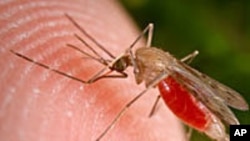A five-day Pan-African conference on malaria has ended in Nairobi, Kenya, with scientists expressing optimism about several developments in the works to prevent, treat, and possibly eradicate a disease that kills nearly one million people in Africa each year.
The development that captured the most attention among the 1,500 scientists at this week's conference was the announcement of a new malaria vaccine that has entered the final stage of trials.
The vaccine, called Mosquirix, began undergoing trials in May in seven countries across Africa - Burkina Faso, Gabon, Ghana, Kenya, Malawi, Mozambique, and Tanzania.
The president of the non-profit PATH Malaria Vaccine Initiative, Christian Loucq, says hundreds of millions of dollars have been pledged by the British drugmaker GlaxoSmithKline and private foundations to ensure that the vaccine trials can be carried out.
Results are not expected for at least another three years. But Loucq says measures are already being taken to ensure that if proven successful, the vaccine will be made available immediately to as many people as possible.
"We are definitely excited about it because we have got a certain level of confidence," said Christian Loucq. "What we want to achieve is to build on the current success. At this point, we have reached 50 percent efficacy. We need to confirm that and by continuing different types of agents of vaccines, we think we can reach 80 percent in the next decade and a half. There is always a minimum chance that we might not succeed. But at this point in time, we are getting data that do seem to confirm that we have got something."
Malaria is a parasitic infection transmitted by mosquitoes. In sub-Saharan Africa, it accounts for some 40 percent of public health spending and malaria-related illnesses and deaths place an enormous burden on many African economies struggling to overcome poverty.
Some specialists at the conference presented studies on possible local remedies for the disease, hypothesizing that as many as one million malarial deaths on the continent could be prevented if people better utilized locally-available plants.
A Nigerian scientist said an herbal medicine derived from the moringa tree, which grows in Kenya and Nigeria among others, has shown particular promise. He said the medicine has undergone successful trials in Nigeria and has been accepted by the World Health Organization.
Overall, scientists stressed that a multi-pronged approach toward eradicating the disease is the best way to cope with a disease that is both adaptable and resilient. They urged international donor to fund not only research into possible vaccines, but other developments that could help human beings stay one step ahead of the parasite.
Researchers estimate that more than $4 billion is needed annually to fully fund the fight against malaria.
News
Pan-African Malaria Conference Ends on Hopeful Note

<!-- IMAGE -->



